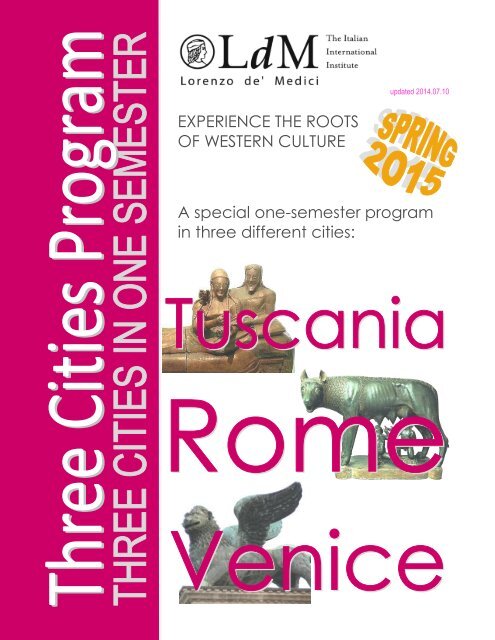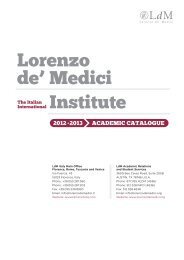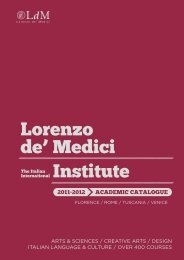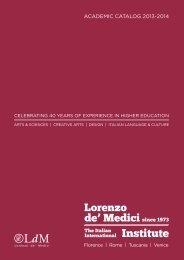LdM Three Cities Program - Lorenzo de Medici
LdM Three Cities Program - Lorenzo de Medici
LdM Three Cities Program - Lorenzo de Medici
- No tags were found...
Create successful ePaper yourself
Turn your PDF publications into a flip-book with our unique Google optimized e-Paper software.
<strong>LdM</strong> <strong>Three</strong> <strong>Cities</strong> <strong>Program</strong>THE PROGRAMThis semester-long program allows stu<strong>de</strong>nts to retrace the steps of Greek, Etruscan,Roman, Medieval and Renaissance cultures by living and studying in three cities whichembody these civilizations in all their richness and splendor: Tuscania, Rome and Venice.Stu<strong>de</strong>nts spend one month in Tuscania followed by one month in Rome, and then theycomplete the experience in Venice. They follow a structured and integrated program offive 3-credit courses, which together comprise both a unique investigation into the rootsof Western civilization and a solid grounding in Italian language and culture.Classes meet every day Monday through Thursday and amount to a total of 45 contacthours per course. There are two mandatory 3-credit courses in the first center, Tuscania:an Italian language course and an introduction to the ancient civilizations of the Greeks,Etruscans and Romans. In the second center, Rome, stu<strong>de</strong>nts take one 3-credit course onthe Middle Ages and the Renaissance. A second 3-credit course in Italian language isinitiated in Rome and completed in the third center, Venice. In addition, in Venice,stu<strong>de</strong>nts conclu<strong>de</strong> the <strong>Three</strong> <strong>Cities</strong> experience by taking a 3-credit course on Venice andthe East.Stu<strong>de</strong>nts’ living and learning in the three locations is closely supported by <strong>LdM</strong>’s expertand experienced team of advisors, support staff and faculty.The program has no special prerequisites, and is <strong>de</strong>signed for all stu<strong>de</strong>nts interested inexperiencing the three locations and learning about Western culture.Page 3 of 8
<strong>LdM</strong> <strong>Three</strong> <strong>Cities</strong> <strong>Program</strong>COURSE SEQUENCESpring 2015First Month: TUSCANIAGreeks, Etruscans and Romans (CLA 275 T / HIS 275 T)Dept. of Archaeology and Classical Studies / History; Cr: 3; Contact hrs: 45Monday to Thursday, 9:00 AM – 11:30 AM3-Hour Italian Language (ITL 101/102/201/202/301 T)Dept. of Italian Language; Cr: 3; Contact hrs: 45Monday to Thursday, 12:30 PM – 3:00 PMNOTE: levels available: Elementary 1 or 2; Intermediate 1 or 2; Advanced 1;placement test will be taken upon arrivalOptional non-credit course (for an additional cost):The Food of Italy: a Gastronomic Tour of the Regions (NUH 016 T)Dept. of Culinary and Nutritional Arts; Cr: 0; Contact hrs: 8Tuesdays 5:00 PM - 7:00 PMSecond Month: ROMEMedieval and Renaissance Transitions (HIS 292 R)Dept. of History; Cr: 3; Contact hrs: 45Monday to Thursday, 3:00 PM – 5:30 PM3- Hour Italian Language (ITL 102/201/202/301/302 R) Part 1Monday to Thursday, 12:30 PM – 1:45 PMNOTE: stu<strong>de</strong>nts will place into the level successive to the one completed in the first city. Thefirst half of the course will take place in this city; the second half in the next city.Third Month: VENICEVenice and the East (HIS 225 V)Dept. of History; Cr: 3; Contact hrs: 45Monday to Thursday, 9:30 AM – 12:00 NOON3-Hour Italian Language Part 2Dept. of Italian Language; Cr: 3; Contact hrs: 45Monday to Thursday, 1:00 PM – 2:15 PMNOTE: this is the conclusive half of the course started in the previous city; 3 credits will begranted upon successful completion of both parts of the course.Please consult the <strong>LdM</strong> <strong>Three</strong> <strong>Cities</strong> Spring 2015 Course Schedule for further <strong>de</strong>tails or time frame updates.Page 4 of 8
<strong>LdM</strong> <strong>Three</strong> <strong>Cities</strong> <strong>Program</strong>PROGRAM CALENDARSpring 2015TUSCANIAWednesday, January 28Thursday, January 29Friday, January 30Monday, February 2Wednesday, February 25Friday, February 27ROMEFriday, February 27Monday to Tuesday, March 2-3Wednesday, March 4Monday, March 30Wednesday, April 1VENICEWednesday, April 1Thursday to Sunday, April 2-12Sunday, April 5Monday, April 6Monday, April 13Saturday, April 25Friday, May 1Wednesday, May 6Friday, May 8Stu<strong>de</strong>nts arrive in Tuscania – Housing check-inOrientationOrientationClasses startClasses endHousing check-out and transfer to RomeHousing check-in/ OrientationBreakClasses startClasses endHousing check-out and transfer to VeniceHousing check-in/OrientationBreakNational Holiday (Easter)National Holiday (Easter Monday)Classes startNational Holiday (Liberation Day)National Holiday (Labor Day)Classes endHousing check-out and <strong>de</strong>partureMore <strong>de</strong>tailed and final calendar given upon arrival and during orientation sessions.Page 5 of 8
<strong>LdM</strong> <strong>Three</strong> <strong>Cities</strong> <strong>Program</strong>THE COURSESCLA 275 T / HIS 275 T - Greeks, Etruscans and RomansThis course presents a survey of the extraordinarily rich civilizations that thrived in Italy and the Mediterraneanfrom the 8 th century BCE to the 5 th century CE. Through colonization of southern Italy and other forms ofcontact (e.g. tra<strong>de</strong>, war, cultural exchange), the Greeks had a fundamental impact on both the Etruscans ofcentral Italy and their conquerors, the Romans. The course investigates the political, social, cultural andreligious dimensions of these civilizations, engaging with surviving literature, art and architecture to helpstu<strong>de</strong>nts un<strong>de</strong>rstand the ancient peoples, values and lifestyles that lie at the heart of the mo<strong>de</strong>rn Westernexperience. The location of the course in Tuscania provi<strong>de</strong>s stu<strong>de</strong>nts with the unique opportunity to explorefirst-hand a number of Etruscan burial sites and the treasures that have been uncovered there.NUH 016 T - The Food of Italy: a Gastronomic Tour of the RegionsAlthough Italian cuisine as whole is characterized by distinctive features, it is still the result of many differentregional culinary traditions that, in today’s Italy, maintain their variety in terms of particular flavors and distinctingredients. Participants in this short non-credit course will learn about culinary differences across the countryand the cultural traditions to which they are linked. Un<strong>de</strong>r the guidance of the instructor, stu<strong>de</strong>nts will enhancetheir culinary skills and knowledge of Italian cuisine through preparing a variety of Italian regional dishes foreveryone to taste.HIS 292 R - Medieval and Renaissance TransitionsBeginning with the <strong>de</strong>cline of Roman civilization <strong>de</strong>scribed in the course “Greeks, Etruscans and Romans,” thiscourse explores the remarkable series of transitions that Western civilization un<strong>de</strong>rwent from the 5 th to the15 th century CE, focusing especially on the Italian perspective and on the reorientation of values experiencedwith the coming of the Renaissance. Topics inclu<strong>de</strong>: the barbarian invasions, medieval Christianity, theCrusa<strong>de</strong>s, the rise of the Italian city states, the Black Death, medieval and Renaissance art and culture, andRome during the fifteenth century. Site visits in Rome will form an essential component of the course.HIS 312 V - Venice and the EastThe course examines the most important European maritime city-state at the climax of its power,from the 12th to the 17th centuries. Through tra<strong>de</strong>, sea-power and cultural exchanges the Venetiansand their empire had a fundamental impact on European civilization and values, connecting as it didthe continent with the Near and Far East. The course presents a multidisciplinary investigation of itsinfluences, achievements, and attitu<strong>de</strong>s. The period covers the more than five centuries of expansionand engagement with the East, with particular attention to Venice’s imperial era. Through study ofthe Venetian heritage, in the form of literature, music, art and architecture, often by direct contactwith institutions, treasures, and monuments, stu<strong>de</strong>nts learn about the political, social, cultural andreligious dimensions of this unique republic. Specific issues to be examined inclu<strong>de</strong>: The <strong>de</strong>velopmentof political and economic power, Mediterranean networks, merchant activities and social life, Veniceas the gate to the Orient, the Ottomans and Venice, Venetian art, print culture and liberty of thought.Page 6 of 8
native speakers possible without strain for either si<strong>de</strong>. Grammar: Consolidation of some structures of the previous levels .The prefixes ri- and re-. Impersonal verbs. Revision and reinforcement of the subjunctive. Subjunctive with conjunctions.Simple conditional + imperfect subjunctive. If-clauses of the 2nd type. Consolidation of passato remoto. Stare vs essere.Passive form with essere, venire and with si. Relative pronouns il quale, colui che. Impersonal form with an adjective andof a reflexive verb. Readings and thematic areas. Changes in the Italian language. Crime and justice in Italy. Advertisingand typical Italian products. Immigration in Italy. Literary passages by Calvino, Buzzati, Ginzburg, Moravia inclu<strong>de</strong>d inRaccontare il Novecento.ITL 302 - 3-Hour Italian Language Advanced 2This is the last of six levels, and it is for stu<strong>de</strong>nts who are fluent in Italian and who can un<strong>de</strong>rstand most TV news andcurrent affairs programs, contemporary literary prose, can write clear texts about a wi<strong>de</strong> range of subjects without mucheffort, plus can interact with a high <strong>de</strong>gree of fluency and spontaneity with native speakers. They will work with differenttypes of original materials (newspaper/ magazine articles, literature excerpts, songs, news) and complete an in-<strong>de</strong>pthgrammar review started in previous level. By the end of the course stu<strong>de</strong>nts should be able to formulate i<strong>de</strong>as andopinions with precision and recognize a wi<strong>de</strong> range of idiomatic expressions and colloquialisms, as well as apply registershifts. Grammar: Review of some structures of the previous levels. Plusperfect subjunctive. Past conditional. Participles.In<strong>de</strong>finite adjectives and pronouns. Review of prepositions. If clauses of the third type. Future in the past. Trapassatoremoto. Review of prepositions and verbs + prepositions. Comparatives. Position of pronouns. Gerund, infinitive,participle. Compound nouns. Tense agreement with indicative and subjunctive. Reported speech. Readings and thematicareas: Body and health. Italian literature. Politics in Italy. Italian music. Contemporary Italian playwrights.More <strong>de</strong>tails can be found in course syllabi, available on request and given on the first day of class in each city.Please refer to your Study Abroad Enrolment Office for Course Schedule, Syllabiand any further information about registration and credit transfer.insert name of office, address and contactsPage 8 of 8





